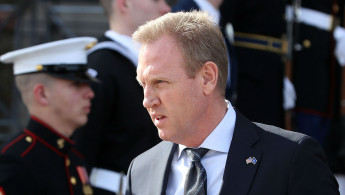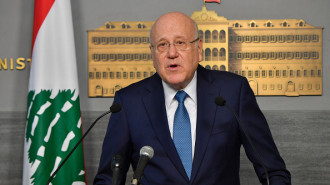Breadcrumb
Pentagon calls for world to rally around US against Iran following tanker attacks
The US has blamed Iran for attacks on shipping in the Gulf of Oman.
2 min read
Shanahan said the world should be united on the Iran tanker incidents [Getty]
The US Pentagon called for an international response to alleged attacks in the Gulf of Oman, which Washington has blamed on Iran.
The acting Pentagon chief on Friday called for an "international consensus" to solving a series of apparant strikes on shipping in the Gulf region over the past month.
"We have an international situation there in the Middle East, it's not a US situation," Patrick Shanahan told reporters, referring to the attacks Thursday on two oil tankers.
"The focus for myself and Ambassador (John) Bolton and Secretary (Mike) Pompeo is to build international consensus to this international problem," he said, referring respectively to the national security advisor and the secretary of state.
The US released a video allegedly showing Iran being behind attacks on two tankers on Thursday, which led to both ships being put out of action.
He said that the US could send more troops to the region, under the US Central Command, or CENTCOM.
"We're making sure that General (Kenneth) McKenzie and the Central Command have the resources and the support that they need," he said.
Shanahan emphasized that "15 percent of the world's oil flows through the Strait of Hormuz", he said.
"So we obviously need to make contingency plans should the situation deteriorate," he went on. "But we also need to broaden our support for this international situation."
The Pentagon last month deployed a warship to the region carrying vehicles, some of them amphibious, and a Patriot missile battery.
Earlier, it also shipped into the region an aircraft carrier to the area in response to what it said were "imminent" threats from Iran.
The US also announced the deployment of 1,500 additional troops to the Middle East in May due to "persistent threats" to American forces from the "highest level" of the Iranian leadership.
The US presence has been further beefed up with reconnaissance aircraft and a squadron of 12 fighter jets.
The acting Pentagon chief on Friday called for an "international consensus" to solving a series of apparant strikes on shipping in the Gulf region over the past month.
"We have an international situation there in the Middle East, it's not a US situation," Patrick Shanahan told reporters, referring to the attacks Thursday on two oil tankers.
"The focus for myself and Ambassador (John) Bolton and Secretary (Mike) Pompeo is to build international consensus to this international problem," he said, referring respectively to the national security advisor and the secretary of state.
The US released a video allegedly showing Iran being behind attacks on two tankers on Thursday, which led to both ships being put out of action.
He said that the US could send more troops to the region, under the US Central Command, or CENTCOM.
"We're making sure that General (Kenneth) McKenzie and the Central Command have the resources and the support that they need," he said.
Shanahan emphasized that "15 percent of the world's oil flows through the Strait of Hormuz", he said.
"So we obviously need to make contingency plans should the situation deteriorate," he went on. "But we also need to broaden our support for this international situation."
The Pentagon last month deployed a warship to the region carrying vehicles, some of them amphibious, and a Patriot missile battery.
Earlier, it also shipped into the region an aircraft carrier to the area in response to what it said were "imminent" threats from Iran.
The US also announced the deployment of 1,500 additional troops to the Middle East in May due to "persistent threats" to American forces from the "highest level" of the Iranian leadership.
The US presence has been further beefed up with reconnaissance aircraft and a squadron of 12 fighter jets.






![Anthony Blinken speech [Getty] Anthony Blinken speech [Getty]](/sites/default/files/styles/image_684x385/public/media/images/6263436E-8ACD-4D3C-9055-25A7BE79DD5A.jpg?h=d1cb525d&itok=fLHmHCRG)
 Follow the Middle East's top stories in English at The New Arab on Google News
Follow the Middle East's top stories in English at The New Arab on Google News


![Paula Yacoubian was verbally attacked by Salim Aoun during a parliamentary session [Getty]](/sites/default/files/styles/image_330x185/public/1150162486.jpeg?h=b9615360&itok=xysBxMUJ)